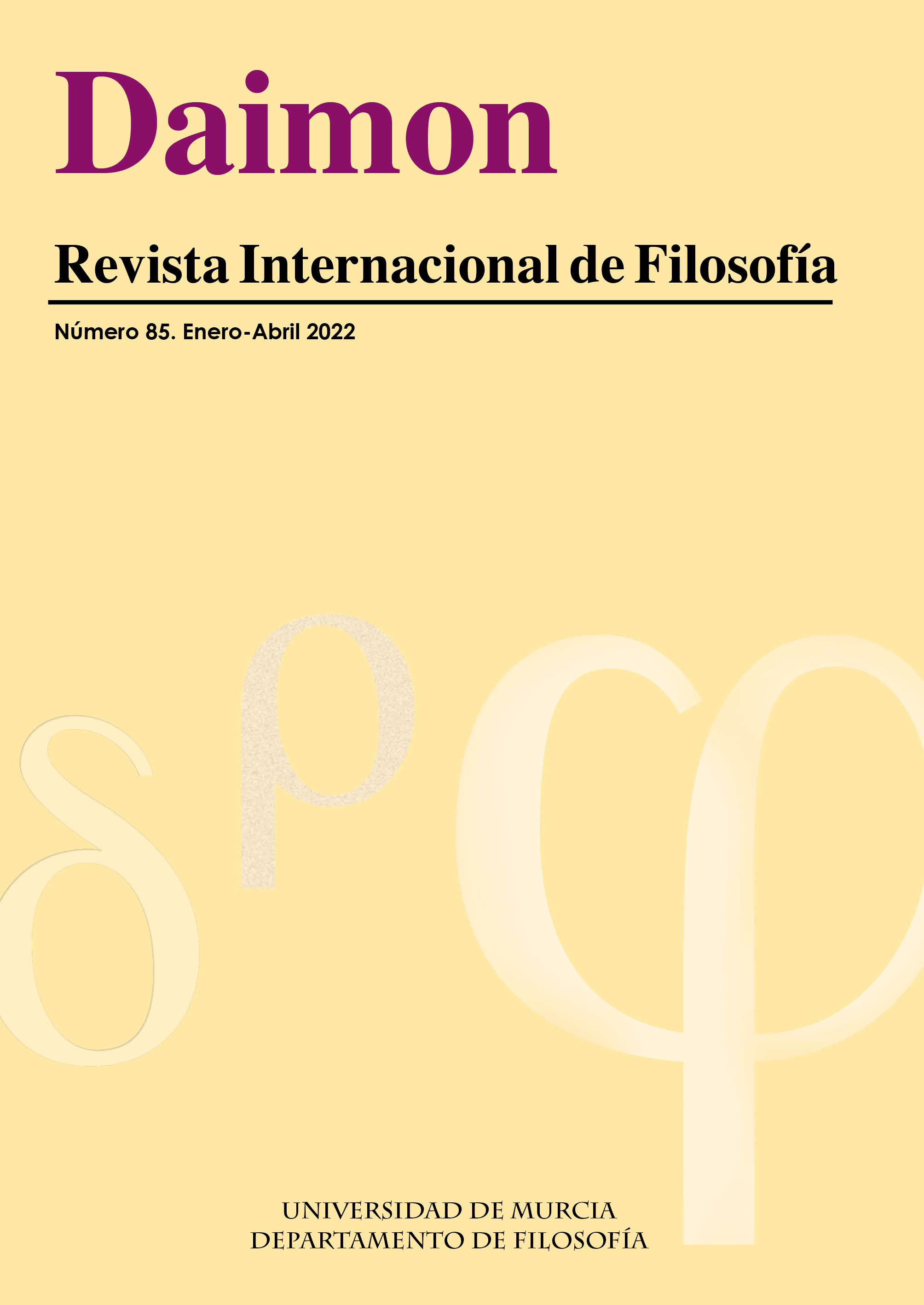¿Emplea Platón el método de Zenón en el Parménides?
Abstract
This paper discusses Plato’s method of hypotheses in the second part of the dialogue Parmenides, which is supposed to be a replica of Zeno’s, as stated in the dialogue itself (135d-e). The discussion is highly relevant because it determines the way the dialogue is interpreted as a whole, as well as its author’s intentions. Furthermore, this will serve to demonstrate the resemblance between the method of both philosophers and its usefulness in Plato’s philosophy.
Downloads
-
Abstract868
-
PDF (Español (España))650
-
HTML (Español (España))384
References
Allen, R.E. (1997), Plato’s Parmenides, New Haven and London: Yale University Press.
Allen, R.E. (1964), «The Interpretation of Plato’s Parmenides: Zeno’s Paradox and the Theory of Forms», Journal of the History of Philosophy, 2, 2, pp. 143-155.
Barnes, J. (1979), «Parmenides and the Eleatic One», Archiv für Geschichte der Philosophie, 61, 1, 1979, pp. 1-21.
Bredlow, L.A. (2011), «Platón y la invención de la Escuela de Elea (Sof. 242 d)», Convivium, 24, 2011, pp. 25-42.
Brumbaugh, R.S. (1961), Plato on the One. The Hypotheses in the Parmenides, New Haven: Yale University Press.
Cordero, N.L. (1991), «L’invention de l’école éléatique (Platon, Sophiste, 242 D) », en Aubenque, P. (ed.), Études sur le ‘Sophiste’ de Platón, Nápoles: Bibliopolis, pp. 91-124.
Cornford, F.M. (1989), Platón y Parménides, Madrid: Visor.
Gardella, M. (2016), «Antilogía y gimnasia intelectual. La Interpretación de Platón sobre Zenón de Elea», Méthexis, 28, pp. 14-32.
Gardella, M. (2015), «El testimonio de Aristóteles sobre Zenón de Elea como un detractor de lo Uno», Eidos, 23, pp. 157-181.
Kahn, C.H. (2013), Plato and the Post-Socratic Dialogue, Cambridge and New York: Cambridge University Press.
Meinwald, C.C. (1991), Plato’s Parmenides, Oxford and New York: Oxford University Press.
Nuño, J.A. (1962), La dialéctica platónica. Su desarrollo en relación con la teoría de las Formas, Caracas: Universidad Central de Venezuela.
Palmer, J.A. (1999), Plato’s Reception of Parmenides, Oxford: Clarendon Press.
Platon (1992), Diálogos, V (Parménides, Teeteto, Sofista, Político), trad. de M. I. Santa Cruz, A. Vallejo Campos y N. L. Cordero, Madrid: Gredos.
Platón (2005), Parménides, trad. de G. R. de Echandía, Madrid: Alianza.
Rapp, C. (2006), «Zeno and the Eleatic Anti-Pluralism», en Sassi, M. (ed.). La costruzione del discorso filosofico nell’età dei Presocratici, Pisa: Ed. della Normale, pp. 161-182.
Robinson, R. (1941), Plato’s Earlier Dialectic, Ithaca and New York: Cornell University Press.
Patterson, R. (1999), «Forms, Fallacies, and the Functions of Plato's Parmenides», Apeiron, 32, 4, pp. 89-106.
Ross, D. (1993), Teoría de las Ideas de Platón, Madrid: Cátedra.
Rossetti, L. (2008), «El “drama filosófico”, invención del s. V a. C. (Zenón y de los Sofistas)», Revista de Filosofía de la Universidad de Costa Rica, 46, 117-118, pp. 29-38.
Rossetti, L., (2011), «Un filosofo senza filosofia», en Barnes, J., et al., Eleatica 2008: Zenone e l’infinito, Sankt Augustin: Academia Verlag, pp. 171-183.
Sinaiko, H.L. (1965), Love, Knowledge, and Discourse in Plato: Dialogue and Dialectic in Phaedrus, Republic, Parmenides, Chicago and London: The University of Chicago Press.
Tabak, M. (2015), Plato’s Parmenides reconsidered, New York: Palgrave Macmillan.
Vlastos, G. (1975), «Plato's Testimony concerning Zeno of Elea», The Journal of Hellenic Studies, 95, pp. 136-162.
Von Fritz, K. (1975), «Zenón de Elea en el Parménides de Platón», Diánoia, 21, 1-11.
Las obras que se publican en esta revista están sujetas a los siguientes términos:
1. El Servicio de Publicaciones de la Universidad de Murcia (la editorial) conserva los derechos patrimoniales (copyright) de las obras publicadas, y favorece y permite la reutilización de las mismas bajo la licencia de uso indicada en el punto 2.
2. Las obras se publican en la edición electrónica de la revista bajo una licencia Creative Commons Reconocimiento-NoComercial-SinObraDerivada 3.0 España (texto legal). Se pueden copiar, usar, difundir, transmitir y exponer públicamente, siempre que: i) se cite la autoría y la fuente original de su publicación (revista, editorial y URL de la obra); ii) no se usen para fines comerciales; iii) si remezcla, transforma o crea a partir del material, no podrá distribuir el material modificado.
3. Condiciones de auto-archivo. Se permite y se anima a los autores a difundir electrónicamente las versiones pre-print (versión antes de ser evaluada) y/o post-print (versión evaluada y aceptada para su publicación) de sus obras antes de su publicación, ya que favorece su circulación y difusión más temprana y con ello un posible aumento en su citación y alcance entre la comunidad académica. Color RoMEO: verde.











